Against Fascism - Women Shall Fight And Win! 8th National Conference of AIPWA Held at Udaipur
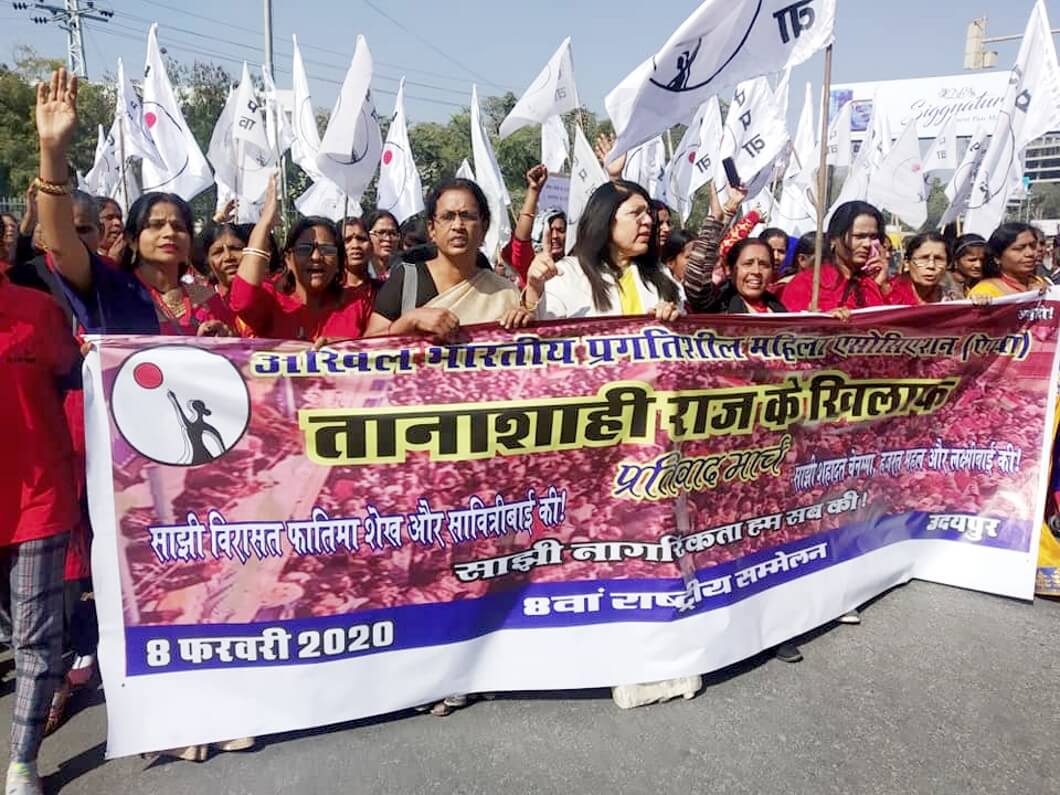
THE streets of Udaipur, Rajasthan were festooned with AIPWA flags, and women's movement posters to welcome the delegates from all over the country to the 8th AIPWA National Conference. All the participants in the Conference had Comrade Srilata Swaminathan very close to their hearts. Comrade Srilata, who had been AIPWA National President, passed away on February 5, 2017. She had always wanted to see an AIPWA National Conference at Rajasthan, which was the state where she had spent most of her life as a communist activist. In tribute to her the Conference was held at Udaipur in her death anniversary week. The main hall of Rajasthan College of Agriculture where the conference took place was named after Comrade Srilata for the occasion while the dais was named after Shaheed Kalibai, the young Adivasi woman killed by police in June 1947 for defending the right of adivasis to attend school defying feudal structures.
The Conference began with a massive procession by women through Udaipur city, during which AIPWA leaders paid their respects to a statue of Dr Ambedkar. Slogans for women's freedom and autonomy, demanding education, employment and heath care, justice for victims of gender based violence, and against the draconian CAA NPR NRC were raised by AIPWA members.
AIPWA vice president Professor Bharti S Kumar unfurled the AIPWA flag outside the conference hall, and everyone kept a minute's silence in memory of martyrs and departed comrades of the women's movement.
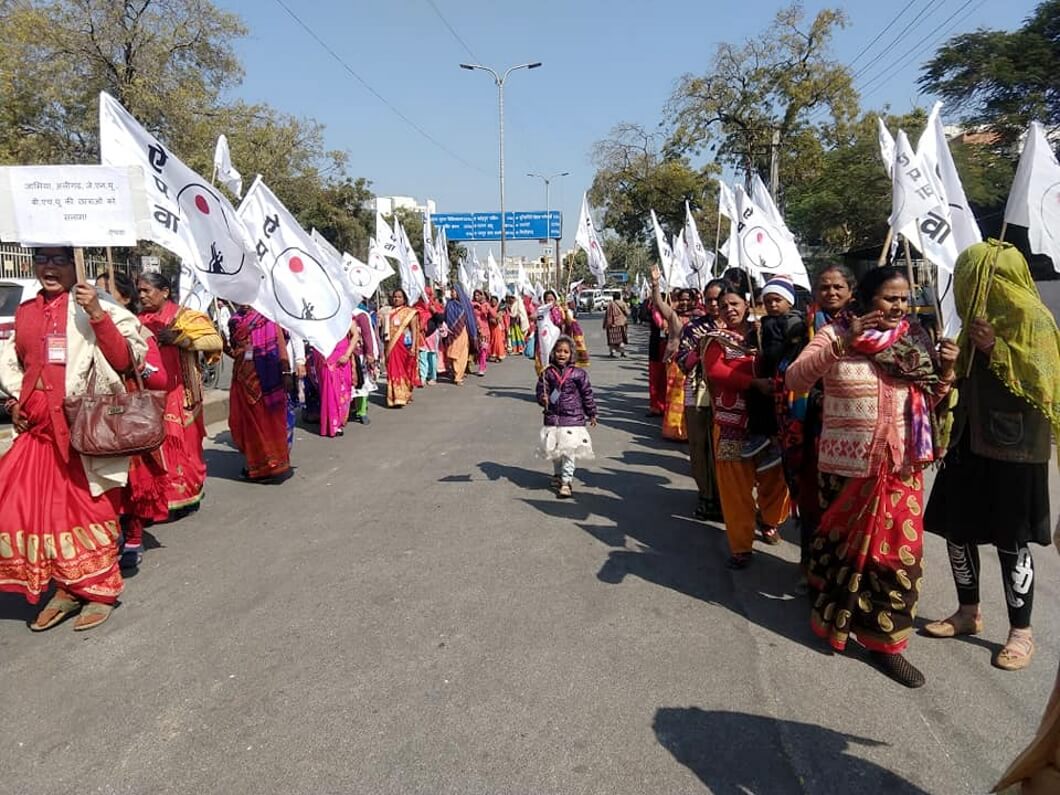
The inaugural session began with a rendering of a song 'AIPWA Zindabad', composed by Comrade Srilata for AIPWA's last conference at Patna in 2016, by a team of young women from Rajasthan. The session was chaired by AIPWA President comrade Dr E Rati Rao, and conducted by AIPWA Secretary Kavita Krishnan. AIPWA General Secretary Meena Tiwari welcomed all the guests and participants warmly to Rajasthan, land of the rebellious Meera Bai who left the deeply restricted life of a princess to follow her heart and conscience and become a poet-saint. She spoke of the shared legacy of Fatima Sheikh and Savitri Bai Phule, who together faced and fought Manuvadi reaction to achieve education for girls and women. The same Manuvadis who threw faeces at Savitri and Fatima, are wanting to replace the Constitution with the Manusmriti today, she said. That is why women and girls are at the forefront of the resistance to fascism in India today, because they know they have the most to lose.
PUCL activist Kavita Srivastava, addressing the conference, said that the ongoing struggle was not just for our citizenship to be recognised and respected rather than doubted and challenged. It was also to assert the fullest rights and entitlements that the State owes every one of us as citizens - dignified employment, free and excellent education and healthcare, and justice and equality for all.
Former AIDWA leader Sumitra Chopra, and NFIW leader Nisha Siddhu from Rajasthan also greeted the conference warmly.
AMU law student Sumayyah spoke of the resistance offered by AMU students in the face of vicious repression. Later, Jamia Millia Islamia students Akhtarista Ansari and Chanda Yadav, two of the four women whose actions defending a male student from police batons inspired the whole country, also addressed the conference about the ongoing movement in Jamia in the face of all odds.
Kavita Krishnan reminded the gathering that 70% of those left out of the Assam NRC were women - as a result of being undocumented. The consequences of having to prove citizenship on the basis of documents is most dangerous for women, she said.
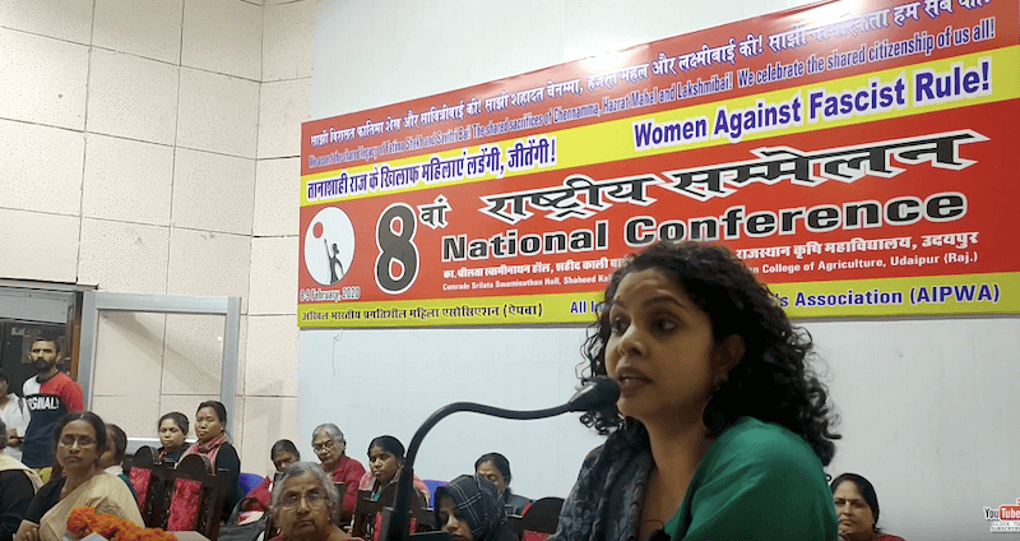
One of the guests at the Conference, Kannada writer and theatre artist Du Saraswathi, spoke eloquently about the lives and struggles of Dalit and working class women. She told two stories from the life of the Buddha with relevance to our times today.
The chief guest at the inaugural session, journalist Rana Ayyub, shared stories from her own life to discuss the discrimination that girl children face, as well as the indelible scars that communal violence inflicts on the lives of Muslims in India. She spoke of the investigative story she did at the age of 26, exposing the gang rape and cold blooded murder of Kauser Bi, wife of fake encounter victim Sohrabuddin, which resulted in Amit Shah, then Gujarat Home Minister, being jailed on charges of murder. She saluted the struggles of the women of the Shaheen Baghs all over India, who are fighting a life and death battle for India's democracy and survival.
Rajasthan comrades gave the guests mementos as a token of appreciation. AIPWA VP and Rajasthan Secretary Sudha Choudhary gave thanks to all the guests and participants who made the inaugural session a success.
The AIPWA Conference also felicitated veteran AIPWA and CPIML activist Comrade Meera, who spoke about her conviction that the present battle against fascism could only be won by a truly revolutionary struggle for social and political transformation.
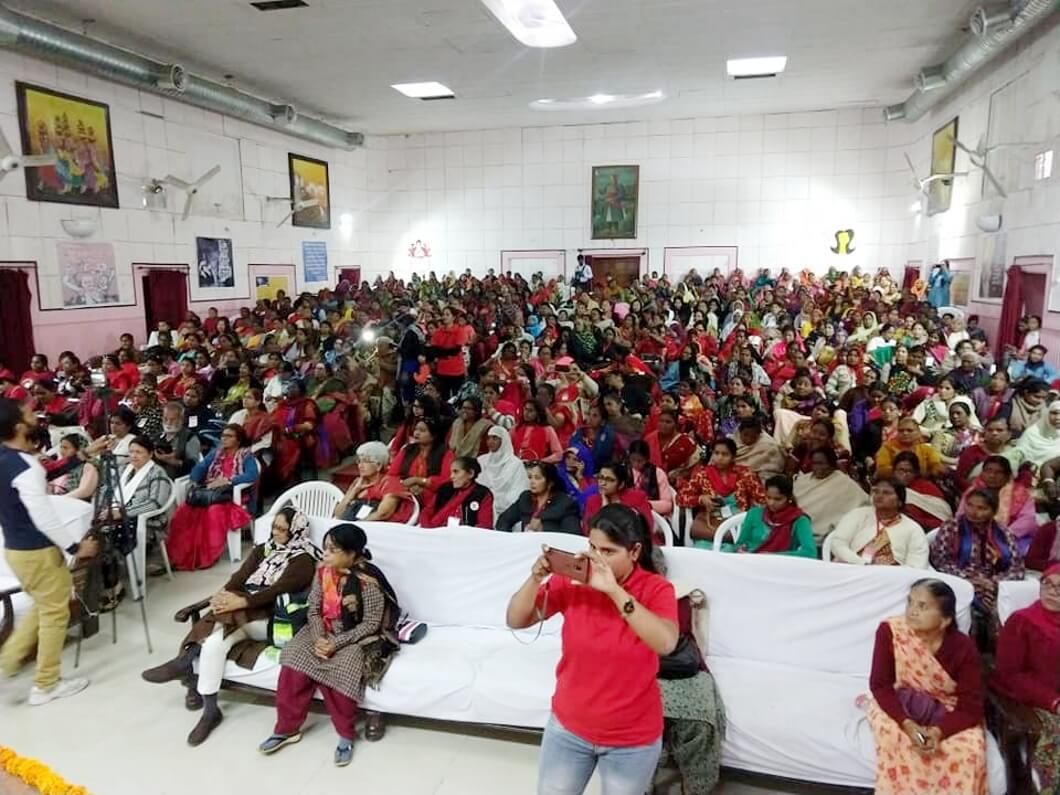
On the night of the 8th February a cultural event took place where the Rajasthani Terah Taali troupe performed the traditional music and dance of Rajasthan. Du Saraswathi then performed her much acclaimed Santimmi Ramayana, which tells the story of Ramayana and Sita from the perspective of a Dalit woman worker. Hers was a heart warming performance which gave many subtle twists to the familiar tale of the epic Ramayana, including deploring the wars men inflict on the world, and celebrating a feminist friendship between Sita and Shoorpanakha.
Comrades Rati Rao, Bharti S Kumar, Krishna Adhikari, Shashi Yadav, Pratima Engheepi, Indrani Dutta, Suvarna Talekar, and Geeta Kumari presided over the delegate session. Comrade Meena Tiwari presented the work report for the past three years, and the plans to meet the challenges and assaults we face today.
Delegates from Assam, Karbi Anglong, West Bengal, Jharkhand, Bihar, Delhi, Madhya Pradesh, Chhattisgarh, Odisha, Rajasthan, Maharashtra, Gujarat, Karnataka, Tamil Nadu, Andhra Pradesh and other states participated in the delegate session and discussed the document.
Cultural team from Patna, Chorus, presented an effective skit exposing the agenda of the CAA NPR NRC.
The delegates elected a 117-menber National Council and a 41-member National Executive, and re-elected Comrade Meena as General Secretary and Comrade Rati Rao as President. The conference resolved to conduct an awareness campaign from 25 February to 2 March highlighting the dangers of the CAA NPR NRC and asserting the mutual harmony and solidarity of Hindus, Muslims, Sikhs, Christians, Buddhists, Jains, Parsis and people of every community and faith.
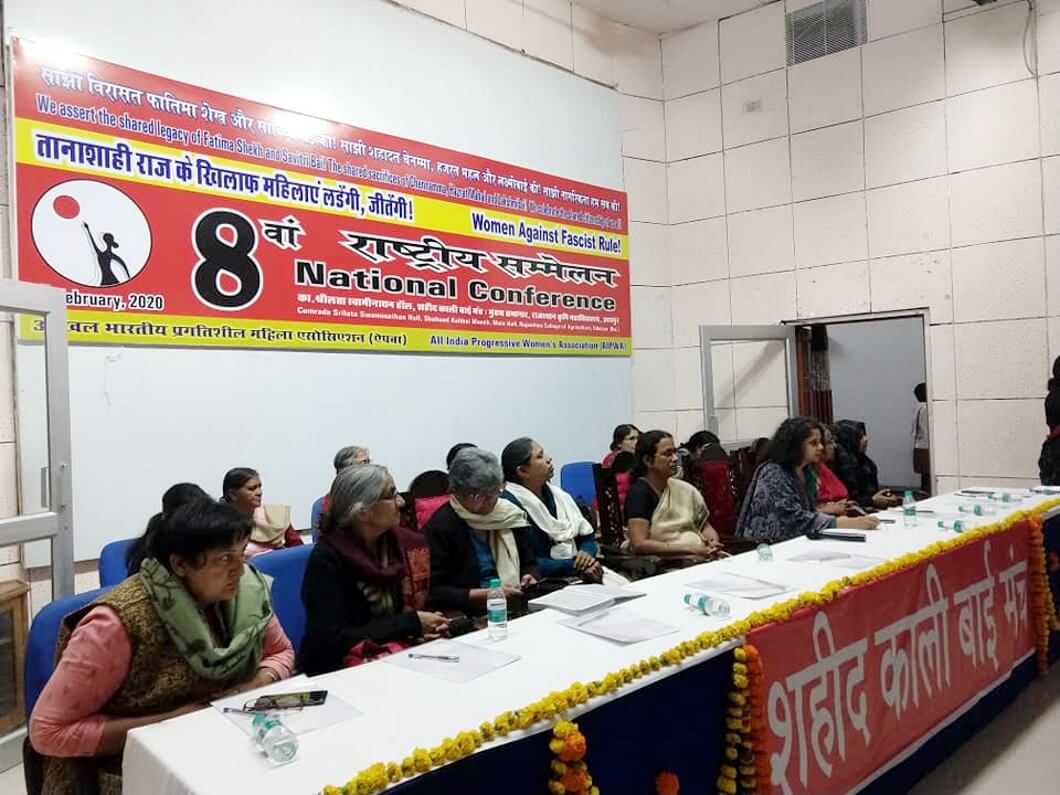
Resolutions passed at AIPWA 8th National Conference
- This Conference resolves that AIPWA committees will work to strengthen the Shaheen Bagh movements being held at various places across the country. Our units will also make full efforts to go amongst poor women of the country, make them aware of the dangers of NPR-NRC-CAA and motivate them to join the movement.
- This Conference resolves to intensify the fight against the repression unleashed on anti-CAA-NRC-NPR protesters. At a school in Bidar, Karnataka school children and their mothers (who are domestic workers) have been charged with sedition for staging an anti-CAA-NRC-NPR play. Similarly, sedition charges have also been slapped against a transgender person in Mumbai and a student in Mysore, Karnataka for slogans and placards. We demand that sedition charges against all such persons should be withdrawn immediately.
- This Conference demands that State governments should immediately issue notifications to formally stop the process of NPR. NPR is nothing but NRC; and a Tehsildar can list anyone as a ‘doubtful citizen’ under NPR and snatch away their voting rights. Of course, there is a clear danger in this to Muslims. But there is also a huge scope for corruption here. Dalits and the poor have put their lives at stake and faced terrible feudal oppression to fight and secure their right to vote. Today that right is again in danger due to NPR-NRC-CAA. Of the 19 lakh persons left out of the NRC in Assam, 70% are women. After NPR-NRC will snatch away the citizenship of crores of people, CAA claims that it will save non-Muslims by making Hindu-Muslim discrimination among those whose citizenship has been taken away. But this claim is a lie. We will not get trapped in this lie. We shall fight together to stop NPR-NRC and scrap CAA, and we shall win.
- This Conference supports the ‘Dilli Chalo’ call given by Young India for 3 March against CAA-NRC-NPR. Instead of wasting lakhs of crores of rupees on NPR-NRC and detention camps, we demand affordable and quality education and health services for all.
- This Conference expresses solidarity with our sisters in Kashmir, and demands that the lockdown on Kashmir should be lifted and Kashmiri people should be given the right to participate in any decision about their future.
- This Conference resolves that AIPWA units will run awareness campaigns against CAA-NRC-NPR from 25 February to 2 March and will organize programs for friendship and harmony among Hindus, Muslims, Sikhs, Christians and all communities.
- This Conference expresses concern over the recent anti-woman and anti-Constitution attitude of the Courts. The attitude of the Supreme Court has also been indifferent on issues like bail to rape-accused Chinmayanand, the Bihar Shelter Home incident, human rights violations in Kashmir, CAA-NPR-NRC, and attacks on Jamia and JNU.
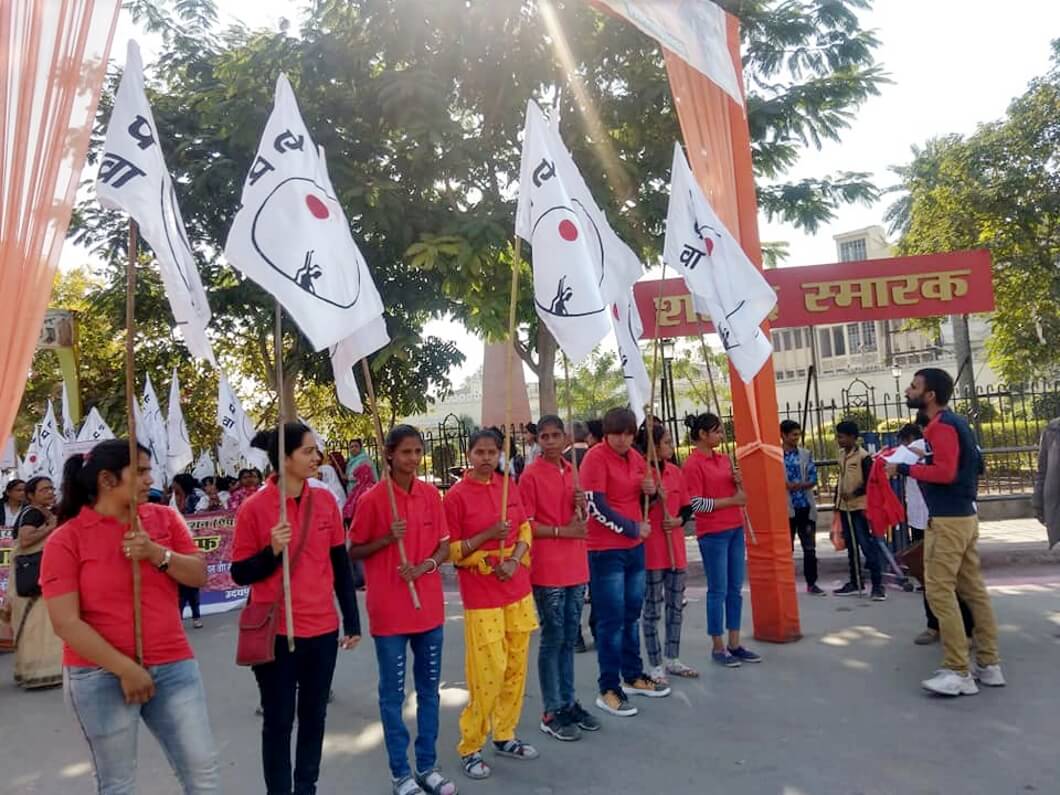
SASG Solidarity message to AIPWA conference
WE in South Asia Solidarity Group would like to send our warmest wishes and our solidarity to the All India Progressive Women’s Association at this 8th National Conference in Rajasthan. The struggles you are waging against fascism and patriarchy in India are a great source of inspiration to us here in Britain.
From the movement confronting violence against women, rape culture, feudal and casteist oppression to the mass protests by women at Shaheen Bagh in Delhi (and the many Shaheen Baghs springing up all over India) against the highly discriminatory CAA and the fascistic NRC and NPR, your powerful collective struggles continuously strengthen our resistance here in the UK.
Under the British state’s racist immigration laws, Black and Minority Ethnic (BME) women have experienced brutal state violence. They are held like criminals and have faced sexual abuse and violence in detention centres. Others, like Sarah Reed, have faced police brutality and been forced into suicide by institutional violence under the Mental Health Act.
The current right-wing Conservative government under Prime Minister Boris Johnson (who is famous for saying that Muslim women wearing burkas look like letterboxes and Black people are ‘Piccaninnies’- a racist term) has eroded health, education and housing services and imposed a so-called ‘hostile environment’ policy which is scapegoating ‘migrants’. It has led to a huge increase in racist attacks on Muslim communities, with Muslim women being especially targeted. This right-wing state with its anti-women policies has also all but destroyed the refuges for women fleeing domestic violence built up over the years by Black and Asian feminists. As a result it is impossibly difficult for women to escape violence as there is no where safe for them to go. In many cases they are forced to return to violent situations where they are sexually and economically exploited.
At the same time Hindutva forces are actively working with the British state to prevent outlawing of caste discrimination in employment, education and public services and suppress progressive voices in academia and work places.
As we send you our warmest solidarity greetings, we also fondly remember Comrade Srilata - her laughter, her fearlessness and her spirit of resistance. We wish you every success for your national conference and look forward to devising new ways to strengthen our links and building a collective feminist force of resistance against fascism and racism.
Lal Salaam!
- Sarbjit Johal, South Asia Solidarity Group, London, UK
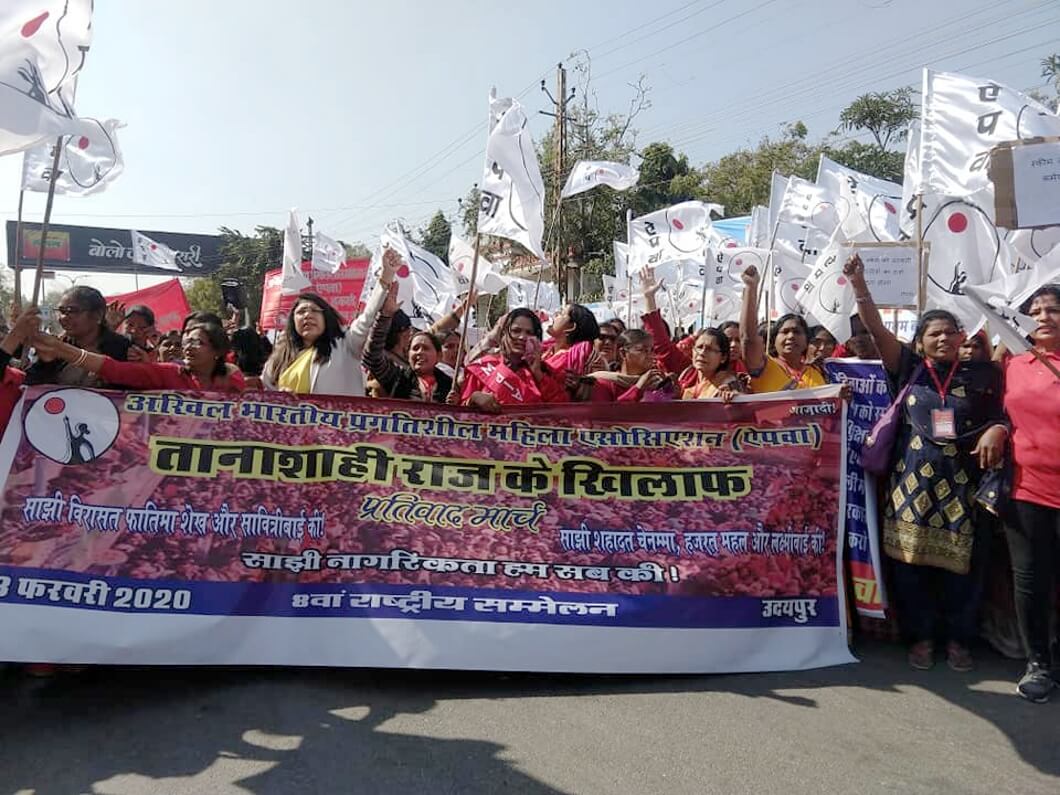
Charu Bhawan, U-90, Shakarpur, Delhi 110092
Phone: +91-11-42785864 | +91 9717274961 E-mail: info@cpiml.org

